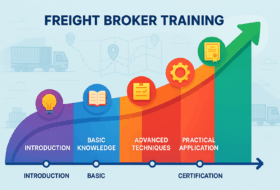The Way a Freight Forwarding Company Works: Freight carriers have only their own licensing, accounting and legal compliances with which to concern themselves. Freight forwarders must be licensed as carriers in all states where they operate, and forwarders who operate internationally must have the appropriate import and export licenses in each country in which they work. In addition, forwarders, acting as prime contractors, must check to make sure that each carrier they employ has proper licensing for the assignment, including maritime and aviation licenses. A freight forwarder must develop a unique system, known as logistics, to track each shipment, confirm carrier changes and follow up on deliveries as goods move along. The broker must package shipments properly, order containers and deliver them in place for carriers that require them.
Forwarders also frequently employ customs specialists to manage international shipments, including export and import declarations. Since freight forwarders act as authorized agents with power of attorney for clients, most have accounting and legal staff to ensure compliance with interstate and international regulations. The forwarding company collects and consolidates all carrier and supplier billing, bills the customer and distributes payments to individual carriers and suppliers. Modern freight forwarders are much more than just shipping brokers or freight carriers. They are managers responsible for the efficient movement of billions of dollars worth of goods over dozens of countries every day.





